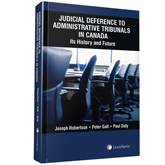Administrative law | Page 3
A Note on Febles v. Canada (Citizenship and Immigration), 2014 SCC 68
I teed up Febles v. Canada (Citizenship and Immigration), 2014 SCC 68 a couple of days ago. The decision was released this morning. Here are the extracts in which the Court addressed the standard of review of questions of international law: I am sorry to have got […] Read more
The Policy/Operational Distinction – A View from Administrative Law
We can all doubtless agree that government action that causes harm to individuals should result in liability, save where officials have had to make difficult decisions in balancing complex economic, social, cultural and political considerations. Drawing a line between government action that gives rise to liability and government action that does not is, however, fiendishly […] Read more
The Policy/Operational Distinction in Canadian Tort Law: R. v. Imperial Tobacco Canada Ltd., 2011 SCC 42, [2011] 3 S.C.R. 45
* This is an extract from a forthcoming article, “The Policy/Operational Distinction — A View from Administrative Law“. Download a draft here. * The uninitiated might look at the Supreme Court’s recent decision in R. v. Imperial Tobacco Canada Ltd., 2011 SCC 42, [2011] 3 S.C.R. 45 and suggest that the policy/operational distinction is no longer […] Read more
When Does an Administrative Record Become a Public Document?
An interesting question, answered in Edmonton (Police Service) v Alberta (Law Enforcement Review Board), 2014 ABCA 267. A complaint was made against a police officer but dismissed by the Chief of the Edmonton Police Service after an internal review. The complainant appealed to the Board. A report of the internal review was made available for […] Read more
Christopher Walker on What Do Regulatory Drafters Do
Regular readers will know that I have no fondness for the idea that the “common objective” of courts and administrative decision-makers is the proper application of the principles of statutory interpretation. In part, my position is that it is unrealistic to expect administrative decision-makers to apply these principles. Some empirical doubt is cast on that […] Read more
Legitimate Expectations and Procedural Fairness: Only a Part of the Analysis?
Canadian courts are to take five factors into account in determining the content of procedural fairness in any given case. One of these factors is whether the applicant had any legitimate expectation about the procedure to be followed. I have always found this unusual. Surely once an applicant establishes that a legitimate expectation has been […] Read more
The gun registry test of federalism
In recent years, the Supreme Court of Canada has emphasized time and again the importance of cooperative federalism. Given the complexity of the modern world, the federal government and the provinces must often work hand-in-hand to solve difficult social, cultural and economic problems. It is no surprise that the Court has recently ruled against various forms of […] Read more
Court Fees, Constitutional Rights and the Common Law
In a remarkable decision yesterday, the Supreme Court of Canada struck down British Columbia’s regime of court fees as unconstitutional: Trial Lawyers Association of British Columbia v. British Columbia (Attorney General), 2014 SCC 59. A litigant was faced with a $3,600 bill for scheduling a 10-day trial. She could not pay the court fees — […] Read more
Investigating Process, Substance and Procedural Fairness
Canadian administrative law is different in many ways from that of other Commonwealth jurisdictions, but on one question it (for the most part) clings doggedly to an old mantra: procedural questions are for the courts alone to decide, without any deference to decision-makers. This orthodoxy has recently been challenged as a matter of principle. But […] Read more

Judicial Deference to Administrative Tribunals in Canada: its History and Future
Is the decision of an administrative tribunal owed deference on the review standard of “reasonableness”? What constitutes an “unreasonable” interpretation of the law? What is the proper application of the deferential standard of review? In short – and based on the ongoing evolution of the deference doctrine – when is it appropriate for a reviewing […] Read more